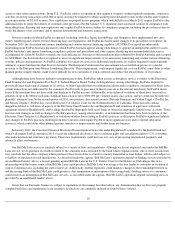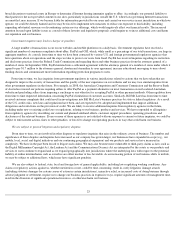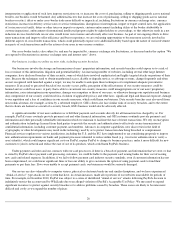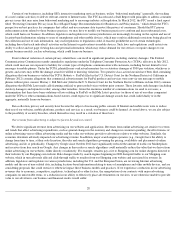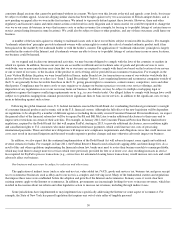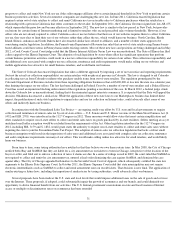eBay 2012 Annual Report Download - page 24
Download and view the complete annual report
Please find page 24 of the 2012 eBay annual report below. You can navigate through the pages in the report by either clicking on the pages listed below, or by using the keyword search tool below to find specific information within the annual report.
use our sites without confirming the source of, and their legal rights to sell, the underlying goods. In addition, from time to time we have
received significant media attention relating to the listing or sale of illegal goods and stolen goods using our services. This negative publicity
could damage our reputation, diminish the value of our brand names and make users reluctant to use our services.
PayPal's payment system is also susceptible to potentially illegal or improper uses, including illegal online gambling, fraudulent sales of
goods or services, illicit sales of prescription medications or controlled substances, piracy of software, movies, music and other copyrighted or
trademarked goods, money laundering, terrorist financing, bank fraud, child pornography trafficking, prohibited sales of alcoholic beverages or
tobacco products, online securities fraud and encouraging, promoting, facilitating or instructing others to engage in illegal activities. There has
been an increased focus by rights owners and U.S. government officials on the role that payments systems play in the sale of, and payment for,
pirated digital goods on the Internet. Recent changes in law have increased the penalties for intermediaries providing payment services for
certain illegal activities and additional payments-related proposals are under active consideration by government policymakers. Despite
measures PayPal has taken to detect and lessen the risk of this kind of conduct, illegal activities could still be funded using PayPal. Any resulting
claims, liabilities or loss of transaction volume could damage our reputation and harm our business.
If our GSI business is unable to enhance its platform and migrate clients to its new platform in a timely and cost-
effective manner, it would
be substantially harmed.
Our GSI business is in the process of enhancing and unbundling the components of its ecommerce and payments platform and migrating its
existing customers to its new platform. This project is very expensive and time consuming and involves significant technical risk. Previously
planned migrations of certain clients to the new platform have been delayed into 2013 and beyond. If client migrations to the new platform
continue to be delayed, the functionality of the new platform is not accepted by GSI's existing clients or prospective clients targeted by GSI, the
new platform contains an unacceptable amount of design flaws or does not perform or operate as expected, or GSI fails to meet client
commitments and services level agreements, GSI could be subject to substantial penalties under its agreements with its clients (including
significant financial penalties and termination rights for its affected clients), its relationships with its clients and their respective businesses could
be substantially harmed, and GSI clients may seek to terminate their contracts with GSI early based on actual or proposed breach. In addition,
GSI's new platform provides for substantially more client control over certain platform functionality, such as promotions and marketing,
operations and performance analytics. If GSI is unable to help clients understand, assess and address their internal preparedness needs for the
new platform, this could result in delays in deployment, client dissatisfaction due to lack of preparedness, degraded site performance, and
additional support costs attributable to client-based issues. We believe that GSI's ability to secure new clients and retain current clients will be
negatively impacted until GSI is able to successfully roll out the new platform in live client implementations. Any of these events or
circumstances could materially and adversely affect our GSI business. Even if accomplished successfully, this development and migration
project may cost more than expected or take longer than planned, which could harm our GSI business.
We are subject to risks associated with information disseminated through our service.
The laws relating to the liability of online services companies for information carried on or disseminated through their services remain
unsettled in many jurisdictions. Claims could be made against online services companies under both U.S. and foreign law for defamation, libel,
invasion of privacy, negligence, copyright or trademark infringement, or other theories based on the nature and content of the materials
disseminated through their services. Several private lawsuits seeking to impose liability under a number of these theories have been brought
against us, as well as other online service companies. In addition, domestic and foreign legislation has been proposed that would prohibit, or
impose liability for, the transmission over the Internet of certain types of information. Our Marketplaces service features a Feedback Forum,
which includes information from users regarding other users. Although all such feedback is generated by users and not by us, claims of
defamation or other injury have been made in the past and could be made in the future against us for not removing content posted in the
Feedback Forum.
Furthermore, several court decisions arguably have narrowed the scope of the immunity provided to Internet service providers like us in the
U.S. under the Communications Decency Act. For example, the Ninth Circuit has held that certain immunity provisions under the
Communications Decency Act might not apply to the extent that a website owner materially contributes to the development of unlawful content
on its website. As our websites evolve, challenges to the applicability of these immunities can be expected to continue. In addition, the Paris
Court of Appeal has ruled in the Louis Vuitton Malletier and Christian Dior Couture cases that applicable laws protecting passive Internet
“hosts” from liability are inapplicable to eBay given that eBay actively promotes bidding on its sellers' listings and receives a commission on
successful transactions, and is therefore a broker. The European Court of Justice decision in the L'Oréal case (see “Item 3: Legal Proceedings”
below) gave
22








